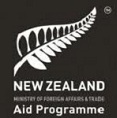New Zealand Aid Program

Grants for technical assistance and research in sustainable development, emphasizing the Pacific Islands and parts of Southeast Asia
Principal Office: New Zealand
The New Zealand Aid Program (NZAID) was created in 2002 within the Ministry of Foreign Affairs and Trade.
Policies and strategies in NZAID reflect the agency’s long-term commitment to foster sustainable development in the developing world, emphasizing the Pacific Islands. New Zealand aims to coordinate its development assistance with other donors such as Australia, in particular.
Grant Programs for Agriculture, Energy, Environment, Natural Resources
1 — New Zealand Partnerships for International Development Fund. The Partnerships Fund encourages organizations in New Zealand to collaborate with partners in developing countries for projects in sustainable economic development. Funding areas include fisheries and energy, oceans, fisheries, climate change and the environment (among others).
APPLICATION: The Partnerships Fund is open to New Zealand organizations in the charitable, not-for-profit, private, and state sectors. The Fund operates through calls for applications. NZAID provides a program description, guidelines, proposal template, and information on how and when to apply. Organizations must be registered with NZAID prior to submitting applications.
About the Partnerships Fund, and how to apply
2 — Collaborate Pacific. The aim Collaborate Pacific is to support effective governance, leadership, regional cooperation, and sustainable development in the Pacific. Collaborate Pacific is a ‘reimbursable fund’ meaning that payment is made at the conclusion of an event, based on actual expenditure.
APPLICATION: Pacific Island citizens, NGOs, government agencies, and civil society can apply to Collaborate Pacific for funding for event and travel costs for activities relevant to the fund’s development priorities. Applications are accepted on a rolling basis.
3 — Scholarships in Developing Countries. NZAID offers a variety of scholarships to citizens of selected developing countries to undertake vocational training or university studies in their home countries, in New Zealand, or in the Pacific region. Some categories of support have regional restrictions (e.g., Southeast Asia and Pacific), while others are open to applicants from a broader range of countries.
[APPLICATION: NZAID describes the different types of scholarships; identifies eligible countries and regions; and provides additional supporting information. For academic studies in New Zealand, each university posts its closing date for applications.
About Scholarships, and how to apply
Geographical Distribution of Grant Activities in Developing Countries
NZAID is active in the countries below, applying the regional geographical framework of the Terra Viva Grants Directory.
Southeast Asia and Pacific Islands: Fiji, Indonesia, Kiribati, Myanmar, Nauru, Papua New Guinea, Solomon Islands, Timor-Leste, Tonga, Tuvalu, Vanuatu
Notes: (1) NZAID is also active in Pacific entities not defined as independent countries in the Terra Viva Grants Directory: Cook Islands, French Pacific Territories, Niue, and Tokelau. (2) In addition to its country programs, NZAID funds regional programs for Southeast Asia (ASEAN), Sub-Saharan Africa, and Latin America and Caribbean.
In some of NZAID’s priority countries, small grants may be possible for certain kinds of local projects through New Zealand’s diplomatic missions.
Contact Us provides information to reach the Ministry of Foreign Affairs and Trade in Wellington, and email addresses for specific types of inquiries.
The Council for International Development (CID) includes most of New Zealand’s major NGOs that work in international programs and projects.
March 2021
